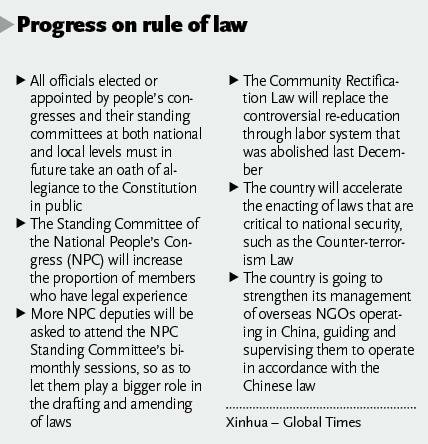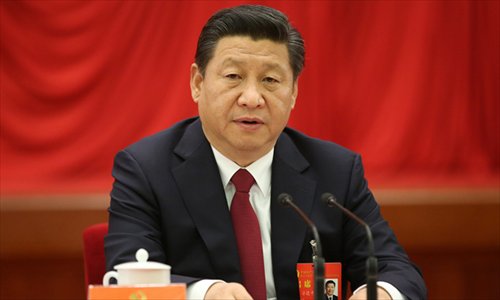HOME >> CHINA
China unveils legal reform blueprint
By Chang Meng and Catherine Wong Tsoi-lai Source:Global Times Published: 2014-10-29 0:48:01
Xi stresses ‘socialist path in rule of law’

Graphics: GT

Xi Jinping, general secretary of the Central Committee of the Communist Party of China (CPC), speaks at the Fourth Plenum of the 18th CPC Central Committee on Thursday in Beijing. Photo: Xinhua
Chinese President Xi Jinping said Tuesday that China will adhere to a "socialist path in the rule of law" under the leadership of the Communist Party of China (CPC) while stressing constitutional supervision and banning extralegal administration by giving authorities a list of powers.
Xi made the remarks in a statement explaining the decisions of the Fourth Plenum of the 18th CPC Central Committee. The meeting was held last week, and yielded key decisions that laid down a blueprint for China to comprehensively advance its legal system along with deepening reform efforts.
The decisions, released in full Tuesday, highlighted the overarching role of the Constitution with Xi pledging that "The authority of the rule of law relies on that of the Constitution."
Yang Xiaojun, a law expert at the Chinese Academy of Governance, hailed the decision for upholding the importance of the Constitution and building a constitutional supervisory system that would hold people accountable for any behavior that goes against the Constitution.
China will also set a list of powers for government and ban administrative authorities from any extralegal power. They cannot create any additional obligations for citizens or others without due authorization, reads the document.
"Establishing a list of powers helps to clarify the relationship between the market and government as China is pressing ahead with its market economy reforms. This will limit the government's power by only laying out what the government can do [with the rest being illegal]," Yang told the Global Times.
While stressing the Constitution, Xi also emphasized that "Party leadership is the most essential feature of socialism with Chinese characteristics, and the most fundamental guarantee of the socialist rule of law."
The decision has given loud and clear answers to questions about China's legal system, that the Party's leadership is not in conflict with judicial construction," said Zhang Xixian, a professor with the Party School of the CPC Central Committee.
While elaborating measures to build a comprehensive legal system under the Party's leadership, emphasizing management of its members with strict discipline also carries heavy weight in the decision. This ensures that officials do not only have to abide by the law, but more importantly, also have to observe even stricter Party rules, said Zhang.
As a clear manifesto to discipline its members, the decision document states that lawmakers should speed up legislation work on the Anti-Corruption Law as a response to calls for a systematic anti-graft mechanism that means "government officials dare not, cannot and do not want to be corrupt," in the wake of a sweeping anti-graft campaign since late 2012.
"A comprehensive legal system cannot be completed without cooperation between six major stakeholders - the Party, the National People's Congress, the government, the judicial bodies, the people and government officials," said Zhang.
The decision also stated that it is necessary to keep the Commission for Political and Legal Affairs of the CPC Central Committee as a major way for the Party to lead related works.
"It is essential for the Party to keep the commission so as to grab hold of the legal reform when the judicial bodies are given stronger powers during the reform. It serves an important function in coordinating different departments, including public security bureaus, courts and procuratorates," Zhang said.
Zhang is confident that abuses of power will not reoccur after the building of a comprehensive legal system, and the investigation into the committee's former secretary Zhou Yongkang.
At a Monday meeting, Xi said the decision document of the fourth plenary session is a "companion piece" with that of the third plenary session held in November 2013, which pledged comprehensive reform.
The juxtaposition of reform and the rule of law suggests that construction of the legal system is by no means a subset of comprehensive reform, yet the two aims are complementary. With the third plenary session having established a framework to clear policy barriers and aimed at stimulating social dynamics to boost the economy, the fourth plenum offered a solution to set up an ideal order for various industries to thrive and a better judicial system to secure people's rights.
As a reflection of this juxtaposition, the decision document stated that China will start to compile a civil code, a move that analysts view as a breakthrough in the country's legislation efforts, and also symbolizes that its market economy system is becoming mature.
A civil code is an outcome and a shield of a market economy, which could encourage investment, secure trade safety, lower trade costs, safeguard human rights and boost technological innovation, Liu Junhai, a law professor with the Renmin University of China, told the Global Times.
He added that different legislative models of various civil laws had impeded the public from exercising their civil rights as some clauses are weak in operability and too vague for people to press charges or for the court to rule, said Liu.
With a draft code submitted to the top legislature in 2002 but which was not enacted, China has accumulated a better legal foundation to restart the work with its thriving market economy and globalization. Compiling a civil code is a symbol of China's legal modernization process, and shows the unprecedented emphasis on the legislation based on the market economy, said Liu.
With extensive measures to build a better legal system, Xi stressed the importance of a fair and independent judiciary as a protection to all.
"The judicial system is the last line of defense for social justice," he said. "If it fails, people will widely question [the country's ability to realize] social justice and it will be hard to maintain stability."
Posted in: Politics